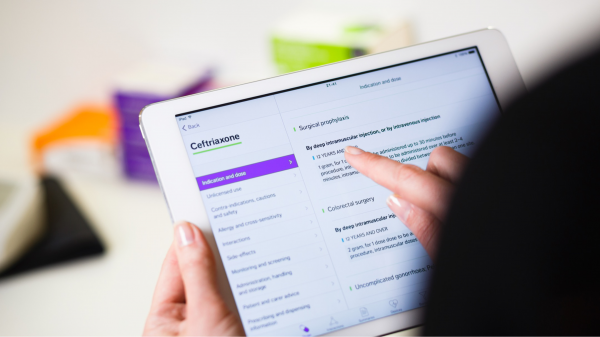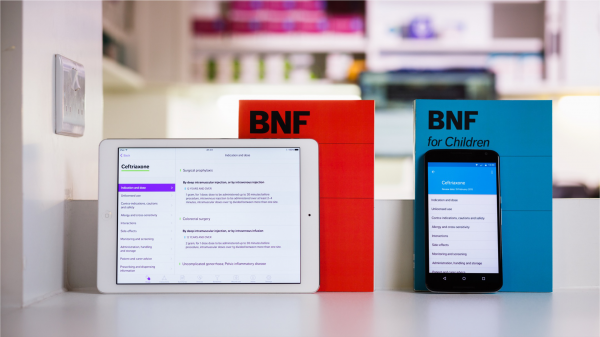




Project Overview
Unless you are a medical professional, you may not have heard of the British National Formulary (BNF), but almost everyone in the UK will have benefitted from it, at one time or another.
Published jointly by the British Medical Association and the Royal Pharmaceutical Society, the BNF is a comprehensive register of all the medicines that are currently available to the National Health Service, including side-effects, doses, legal classifications, prices, indications (symptoms that suggests certain medical treatment is necessary) and contraindications (specific situations in which a drug should not be used).
First published in 1949, it is used every day by doctors, nurses, pharmacists, and paramedics to safely prescribe medicines to patients across the UK. At its peak, half a million copies were printed, and it is thought the format of the book was originally designed to fit in the pocket of a doctor’s traditional white coat.
Modern Human helped transform the BNF from a primarily paper format to a specialist App. Launched in July 2017, the App is in use by a third of NHS clinicians and has been used to treat over 4 million patients.
Project Commissioner
Project Creator
Team
Paul-Jervis Heath - Founder of Modern Human
Chloe Heath - Managing Director of Modern Human
Jude Rattle - Researcher
Johanna Kollmann - Researcher
Mark Mitchell - Designer
Claire Knight - Developer
Karen Baxter - BNF Director
Kate Towers - Editor, BNF
Kristina Fowlie - Editor, BNF
Harvinder Sondh - Director of Innovation
Project Brief
While conducting research for another Royal Pharmaceutical Society project, we identified opportunities to improve the BNF.
We had observed clinicians using the BNF and witnessed what we affectionately called the '5 finger grip'. This is how clinicians held the BNF book, checking multiple pages for different information about each drug. Often, they would be checking various sections for information about different drugs, remembering it, bookmarking the page with a finger, then flicking back and forth between information on other pages, double and triple checking. We were convinced that there was a better, quicker, and easier way to access this vitally important information, and the Royal Pharmaceutical Society agreed.
We were commissioned to research and create a digital product. The product needed to be:
· intuitive and easy to use
· updated on a regular basis
· accurate, providing clear and fast access to information
· portable, so clinicians could use regardless of where they were
Project Need
To begin with, we wanted to understand as much as possible about how, when, and why health professionals use the BNF. Through ethnographic design research, we immersed ourselves in the world of doctors, nurses, and pharmacists, shadowing them as they went about their daily work.
From the research, there were several major insights.
First, clinicians confirmed that the constant rechecking between pages of the BNF could be time consuming and created uncertainty. There was a worry that they had they missed something.
Second, we paid careful attention to the factors that have led to poor adoption of other digital tools in clinical settings. Clinicians were clear they did not want to be saddled with having to remember passwords, and they needed control over when updates occurred, so there could be no unwanted or unexpected disruption when looking after a patient. From a technology standpoint, it was apparent that many hospitals had poor WiFi, and that pharmacies were often situated in basements, where phone signals were weak.
Third, accuracy of the information was of fundamental importance, as mistakes had the potential to cause serious harm to patients.
From the research findings, it was decided that an app was the best approach. We iteratively tested prototypes of an app in a variety of clinical settings to assess safety, accuracy and identify opportunities to save health professionals valuable time.
User Experience
The core feature of the App is an interaction checker that quickly and intuitively helps clinicians ensure the safety of their patients by quickly checking for possible drug interactions (which drugs can be safely used with others).
It is updated every month with the latest clinical content, so doctors, nurses and pharmacists can be sure they are using the very latest information available to treat patients, and there is uninterrupted offline access.
The standard interaction patterns of the respective App platforms of iPhone and Android have been applied to make the App as intuitive as possible.
Usage of the app has been growing sharply since launch. It is currently used to prescribe drugs to about 1.5 million patients a month. Growth has been consistent through 2018: In February 2018 the App was used in 1095547 (1.1m) cases and in March 2018 1302861 (1.3m) cases.
The feedback from clinicians has been very positive:
“Indispensable app for doctors in the UK.”
“The new app is remarkably easy to use, finding guidance for various infections and problems with just a few touches. The new interactions tool is really elegant too.”
“The BNF app has made a major contribution to modernising information provision in healthcare. The app’s design is absolutely focussed on the needs of clinicians and has been a great success. It is very intuitive, enabling the user to check drugs and drug interactions quickly and above all accurately,” concludes Karen Baxter, Director of BNF.
Project Marketing
Every doctor, nurse and pharmacist in the UK is familiar with the BNF. A copy of the printed BNF is shipped to every NHS prescriber annually. They are taught to use the book and interpret the information it contains during their training. Many develop a fondness for it and there are instagram pictures of BNF cakes for when student doctors and pharmacists graduate.
The printed BNF has very high market penetration and very high awareness. The product marketing challenge is to move people from the print edition to the new App. The client's product marketing efforts have been very successful. Over a third of NHS prescribers have used the app. Almost all of them have used it more than once and usage statistics show that 60% use it at least once a week.
Although the App is provided free in the UK, our work with the BNF has opened potential new revenue channels for digital BNF products in other markets, particularly developing countries, in the high street pharmacy sector, and with pharmaceutical companies for drug development. These are currently being explored.
Project Privacy
There are no log in details for the BNF app and it neither collects or stores any personal data of either clinician users or patients.
Digital - Health
From ground-breaking apps accelerating medical research to apps helping consumers make healthier choices, we're looking for apps that are making health information and medical services more accessible to all.
More Details

